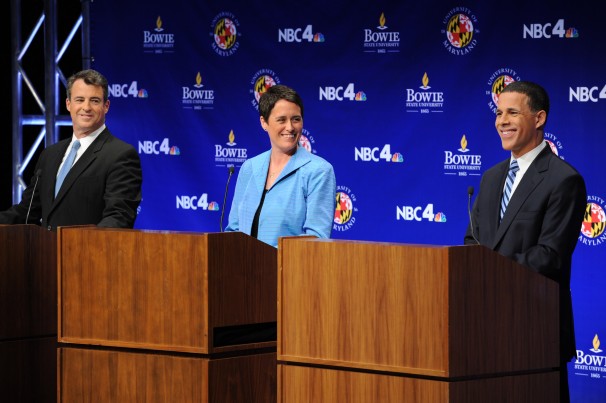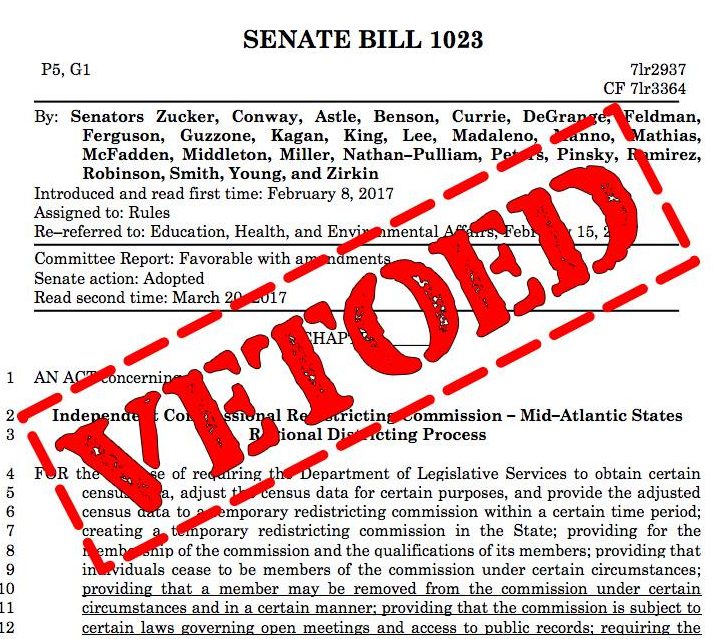By Barry Rascovar
For MarylandReporter.com
Maryland Gov. Larry Hogan, Jr. may not have supported or voted for President-elect Donald Trump but they agree on one thing: Corporate welfare works.
Throwing money and tax breaks at Northrop Grumman, Marriott International and United Technologies did the trick this past week – along with a good deal of loud, Trumpian threats in the case of UT’s subsidiary, Carrier Corp., in Indiana.
To prevent Carrier from moving 1,400 jobs to Mexico, Trump used heavy-handed insinuation of future punishment to deliver a largely symbolic message that he’ll stop at nothing to save American manufacturing jobs.
Hogan’s task was somewhat different and involved persuasion rather than threats – backed by wads of cash.
A $57.5 million five-year package of “loans” and tax credits eventually persuaded Northrop Grumman to keep its 10,280 employees in Maryland – including the 6,800 who work at the massive former Westinghouse electronics complex near BWI Airport in Linthicum.
Meanwhile, a state-county incentive package of some $60 million was needed to keep Marriott’s headquarters in Montgomery County instead of shifting to Northern Virginia.
The bonus here is that Marriott intends to erect a $600 million complex in downtown Bethesda for its 3,500 HQ employees. That number should expand due to Marriott’s recent $13 billion acquisition of Starwood International.
Deals rescued from limbo
The two Maryland deals have been in limbo for months due to high-risk brinkmanship by legislative leaders. The idea was to squeeze money out of Republican Hogan for other purposes dear to the hearts of Democrats in exchange for approval of the Northrop Grumman package.
That gambit, which was poorly conceived from the get-go, fell apart when the state’s tax collections underperformed, leaving a gaping hole in Hogan’s budget.
Hogan had always balked at legislators’ extortion effort to hold the Northrop Grumman package hostage until local school funds and other goodies were released.
Lawmakers didn’t seemed to care that reneging on the business deal would have sent a terrible message about Maryland’s business climate to corporations thinking about relocating operations.
But the weak revenue figures this fall put an end to this embarrassing folly. There was no money to make the lawmakers’ strong-arm deal work.
Hogan, though, still needed to gain the support of legislative leaders not only on the Northrop Grumman package but also the Marriott aid proposal.
He and Senate President Thomas V. Mike Miller finally came up with a workable compromise involving $20 million in school pension funds for localities in next year’s budget.
Now it is up to Miller and House Speaker Mike Busch to complete their end of the bargain by winning approval for the two business-assistance packages from a legislative panel they control.
Plenty of irony
There’s plenty of irony here.
Had a Democrat been in the governor’s office, there’s no question Busch and Miller would have rushed to support these economic-development packages, just as they did under former Gov. Martin O’Malley.
But with a Republican in the governor’s mansion, Busch and Miller suddenly found problems with these deals.
Liberal Democrats, in particular, blanch at the thought of giving away millions in business-retention packages, labeling it “corporate welfare.”
It’s become customary for large companies to demand payments from local and state governments if those governments want to prevent these businesses from moving elsewhere. Democrats fear that more companies will use the same tactic to pry millions from the state, money Democrats want spent on social programs.
Rigidly ideological Republican conservatives also rail against giveaways to corporations, complaining about government interference with the free-market system.
The thinking goes that if Carrier wants to move its manufacturing plant to Mexico or to another state to cut costs, the company should have the freedom to do so. That’s how the free market works, fiscal conservatives say.
Yet Trump intervened to make political hay and win cheers from Carrier workers in Indiana.
Other Indiana plants closing
At the same time, he did nothing to stop United Technologies from closing another Indiana plant, costing 700 workers their jobs.
Nor did he lift a finger to halt Rexnord from shuttering a factory just a mile away from the Carrier building. The job loss there is 300. Rexnord is moving its manufacturing business to Mexico.
A third company, CTS, is also shutting down an electronics manufacturing facility in Indiana, creating unemployment for 200 more workers.
On top of that Carrier is continuing with plans to downsize its Indiana plant, laying off 600 union workers at the furnace factory. Also, despite Trump’s plea Carrier is moving its fan coil-making business to Monterrey, Mexico.
So while Trump can crow about the one plant he pressured to remain open, saving by his count 1,000 U.S. jobs (the actual jobs preserved: 730), he hasn’t done a thing about the other 1,800 manufacturing jobs being lost in Indiana.
The downside of corporate bailouts (Carrier is getting $7 million in tax breaks from Indiana to remain there) is that these small triumphs fail to address the larger problem: U.S. manufacturing plants increasingly find they are unable to compete against low-cost overseas competitions.
Here’s a hint why moving production abroad is happening: The average salary for a unionized Carrier plant worker in Indiana is $30.90 an hour.
Winners and losers
Choosing winners and losers, as Trump did in Indiana, solves little and provides job solace for just a fraction of the manufacturing workforce at risk of losing their source of income. A more comprehensive approach is needed.
Since the beginning of 2015, 1,600 American companies have shifted production overseas. In November alone, the U.S. lost 10,000 manufacturing jobs.
Clearly, Trump has a gargantuan task ahead of him in which a partial victory at Carrier’s Indiana plant doesn’t put a dent in the problem.
At the same time, Hogan is having more success keeping large corporations content with their Maryland digs. All it takes is persistent negotiations, expressions of good will and a basketful of state and county tax breaks, job-training grants and forgivable loans.
It’s worked most of the time for both Democratic and Republican governors in Maryland.
Hogan’s job is far easier because he’s only competing against other U.S. states, not Third World, low-wage countries.
Trump has a much more difficult field to plough.
Barry Rascovar’s blog is www.politicalmaryland.com. He can be contacted at brascovar@hotmail.com






There is an old adage in Economic Development that goes ‘tax breaks/credits, and other financial incentives do not make a bad place good!’
It is only after a company has fully vetted locations with regards to all of the elements and factors involved in relocation/expansion, i.e., labor costs, land/rent and construction costs, utility costs, environmental and ecological costs, etc., that the ‘game is played.’ Albeit, labor cost is always number one on the check-off list; because it is number one on the expense side of the ledger.
It is then that States, Counties and Municipalities are forced into the competitive atmosphere of providing/offering tax breaks/credits, and other financial incentives. Relocation/expansion executives know how the ‘game is played’ al too well, and ‘play’ States, Counties and Municipalities against one another, effectively.
On the global stage, according to the Bureau of Labor Statistics the US average hourly earnings of all employees on private nonfarm payrolls, seasonally adjusted, for Nov. 2016, is just under $26.00/hr.
In 2014, one in seven Mexican workers earned the average minimum wage of 65.58 pesos ($5.10) a day or less, national statistics office INEGI says. BLS has developed estimates of hourly compensation costs in China’s manufacturing sector; compensation estimates for 2009 are: Urban-$2.85; Rural-$1.15; All Firms-$1.74. Is it any wonder why companies leave!
Corporate welfare to incentivize companies to locate or remain in a given state or county is a time honored tradition that crosses party lines. Mr. Rascovar has written a very balanced piece that describes well the both the benefits and problems associated with this activity. In the end, jobs matter and Montgomery County (and the state) did the right thing with Marriott. Nice work, all.